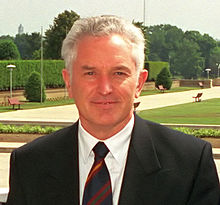Max Bradford
Max Bradford | |
|---|---|
 Max Bradford in 1999 | |
| 33rd Minister of Defence | |
| In office 5 December 1997 – 10 December 1999 | |
| Prime Minister | Jenny Shipley |
| Preceded by | Paul East |
| Succeeded by | Mark Burton |
| Personal details | |
| Born | Maxwell Robert Bradford 19 January 1942 Christchurch, New Zealand |
| Political party | National |
Maxwell Robert Bradford (born 19 January 1942)[1] is a former New Zealand politician and cabinet minister. He was an MP for the National Party from 1990 to 2002. He is best known for introducing the "Bright Future" economic initiative in 1999, and for changes to the retail sector of the electricity industry in 1998.[2][3]
Early life
[edit]Bradford was born in Christchurch and educated at Christchurch Boys' High School and the University of Canterbury. He is married to Rosemary Bradford and has two stepdaughters.
Before entering politics, he worked at the New Zealand Treasury, the International Monetary Fund, and the New Zealand Employers Federation. He was chief executive of the NZ Bankers Association and the New Zealand National Party before entering the New Zealand Parliament as an MP in 1990.
Member of Parliament
[edit]| Years | Term | Electorate | List | Party | |
|---|---|---|---|---|---|
| 1990–1993 | 43rd | Tarawera | National | ||
| 1993–1996 | 44th | Tarawera | National | ||
| 1996–1999 | 45th | Rotorua | none | National | |
| 1999–2002 | 46th | List | 15 | National | |

Bradford was first elected to Parliament as MP for Tarawera in the 1990 election, replacing National Party colleague Ian McLean. In the 1996 election, there was an electoral redistribution following the introduction of the Mixed Member Proportional (MMP) electoral system in New Zealand. He contested and won the Rotorua electorate. In the 1999 election, he was defeated in Rotorua by Labour's Steve Chadwick, but remained in Parliament as a list MP. In his political career, he served in a number of Cabinet positions, including Minister of Defence, Minister of Energy, Minister of Labour, Minister of Revenue, Minister of Enterprise and Commerce, Minister of Tertiary Education and Minister of Immigration.[4]
After politics
[edit]After retiring from Parliament in 2002, Bradford became a director in Castalia Strategic Advisors Ltd, an international consultancy practice specialising in governance, energy and water reform.[citation needed] In 2007, he established his own consultancy Bradford & Associates Ltd specializing in governance advisory and implementation projects[citation needed] He has consulted for organisations such as the World Bank, the Inter-American Development Bank, the Asian Development Bank and foreign governments, and has worked in Guyana, Liberia, Sudan, Bangladesh, Vietnam, Guinea-Bissau, Haiti, Fiji, and Cambodia amongst other countries.
From 2013 to 2014 he led a World Bank project on behalf of Oxford Policy Management to help improve the effectiveness of the Public Accounts Committee and other financial oversight committees of the Bangladesh Parliament.[citation needed]
In 2013, he was voted [1] New Zealand's best energy minister in recent years.[5]
He retired in 2015.[citation needed]
References
[edit]- ^ Temple, Philip (1994). Temple's Guide to the 44th New Zealand Parliament. Dunedin: McIndoe Publishers. p. 55. ISBN 0-86868-159-8.
- ^ Young, Audrey (13 August 2008). "Peters 'forgets' NZ First support for power reforms". The New Zealand Herald. Retrieved 13 May 2011.
- ^ Pullar-Strecker, Tom (15 February 2010). "Lights flicker on electricity IT projects". Stuff.co.nz. Retrieved 13 May 2011.
- ^ "Max Bradford to retire at next election". The New Zealand Herald. 4 April 2002. Retrieved 29 May 2015.
- ^ "Bradford voted best Energy Minister | Kiwiblog". 5 March 2013.
External links
[edit]- 1942 births
- Living people
- Members of the Cabinet of New Zealand
- Defence ministers of New Zealand
- New Zealand National Party MPs
- New Zealand list MPs
- Members of the New Zealand House of Representatives
- New Zealand MPs for North Island electorates
- People educated at Christchurch Boys' High School
- University of Canterbury alumni
- 21st-century New Zealand politicians
